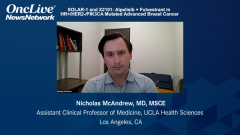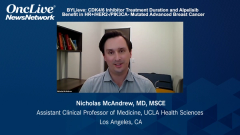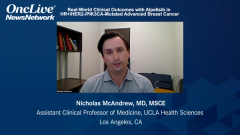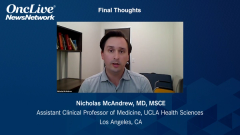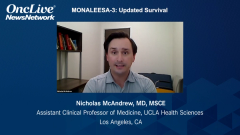
Final Thoughts
Nicholas McAndrew, MD, MSCE, provides final thoughts on findings reported at ASCO 2021 for patients with HR+/HER2-/PIK3CA-mutated advanced breast cancer.
Nicholas McAndrew, MD, MSCE: This year at the 2021 ASCO [American Society of Clinical Oncology] Annual Meeting in hormone receptor–positive HER2 [human epidermal growth factor receptor 2]–negative metastatic breast cancer, we saw a variety of interesting studies presented that give us some new information and help reassure us with prior data as well. With CDK4/6 inhibitors, we saw updated results from the MONALEESA-3 trial that show continued benefit in terms of overall survival with the addition of ribociclib in the first- or second-line settings.
We also saw a number of abstracts presented in the PI3K-positive metastatic breast cancer setting, which helped us understand some clinical characteristics that are associated with long-term disease control in some cases. It also helped us understand that patients who had done well, or maybe not so well, on a prior CDK4/6 inhibitor are equally likely to do as well on second-line alpelisib. Then we were presented some real-world data that helped us understand that alpelisib still seems to be effective in a real-world setting, despite PIK3CA mutations that weren’t included in the original data.
In all, there were some exciting data that are going to help clinicians make excellent decisions for their patients post-ASCO.
Transcript edited for clarity.


